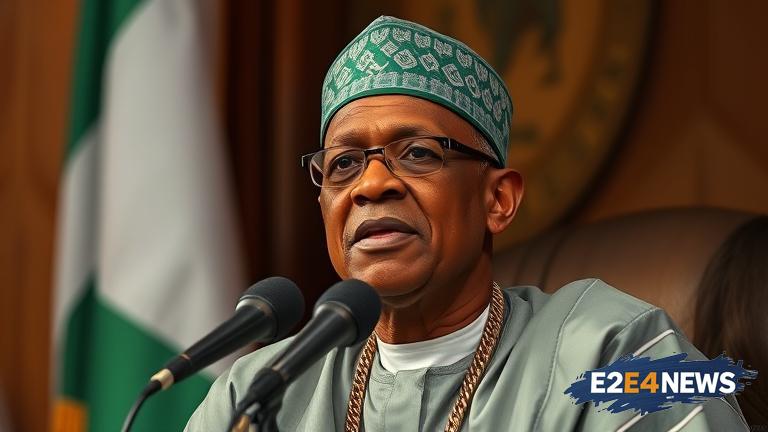The Nigerian President has recently rejected a proposal for a one-term presidency, sparking a heated debate on the country’s leadership tenure. The President’s decision has been met with mixed reactions from citizens, with some hailing it as a bold move to ensure continuity and stability in governance, while others have expressed concerns about the potential for abuse of power. The one-term presidency proposal had been touted as a means to prevent the concentration of power and promote democratic rotation. However, the President has argued that a one-term limit would hinder the ability to implement long-term policies and projects. The President’s stance has been supported by some lawmakers, who claim that a one-term presidency would lead to a lack of accountability and instability in the government. On the other hand, opposition parties have criticized the President’s decision, citing the need for a more democratic and inclusive system. The debate has also sparked discussions on the role of term limits in preventing authoritarianism and promoting good governance. Some analysts have argued that term limits can help prevent the entrenchment of power and promote a peaceful transfer of power. Others have countered that term limits can also lead to a lack of continuity and stability, particularly in countries with fragile institutions. The Nigerian President’s rejection of the one-term proposal has also raised questions about the country’s democratic trajectory. Some have expressed concerns that the decision could undermine the country’s democratic progress and pave the way for authoritarianism. However, others have argued that the President’s decision is a necessary step to ensure stability and continuity in governance. The debate has also highlighted the need for a more nuanced discussion on term limits and their impact on democratic governance. Furthermore, the President’s decision has sparked a wider conversation on the role of leadership in promoting economic development and stability. Some have argued that a stable and effective leadership is essential for promoting economic growth and development. Others have countered that leadership is only one factor in promoting economic development, and that other factors such as institutional strength and economic policies also play a crucial role. The Nigerian President’s rejection of the one-term proposal has also raised questions about the country’s economic future. Some have expressed concerns that the decision could undermine the country’s economic stability and pave the way for economic instability. However, others have argued that the President’s decision is a necessary step to ensure economic continuity and stability. The debate has also highlighted the need for a more nuanced discussion on the relationship between leadership and economic development. In addition, the President’s decision has sparked a wider conversation on the role of institutions in promoting democratic governance and economic development. Some have argued that strong institutions are essential for promoting democratic governance and economic development. Others have countered that institutions are only one factor in promoting democratic governance and economic development, and that other factors such as leadership and economic policies also play a crucial role. The Nigerian President’s rejection of the one-term proposal has also raised questions about the country’s institutional strength. Some have expressed concerns that the decision could undermine the country’s institutional strength and pave the way for institutional instability. However, others have argued that the President’s decision is a necessary step to ensure institutional continuity and stability. The debate has also highlighted the need for a more nuanced discussion on the relationship between institutions and democratic governance. In conclusion, the Nigerian President’s rejection of the one-term proposal has sparked a heated debate on the country’s leadership tenure and democratic governance. While some have hailed the decision as a bold move to ensure continuity and stability, others have expressed concerns about the potential for abuse of power. The debate has highlighted the need for a more nuanced discussion on term limits, leadership, and institutions in promoting democratic governance and economic development.





